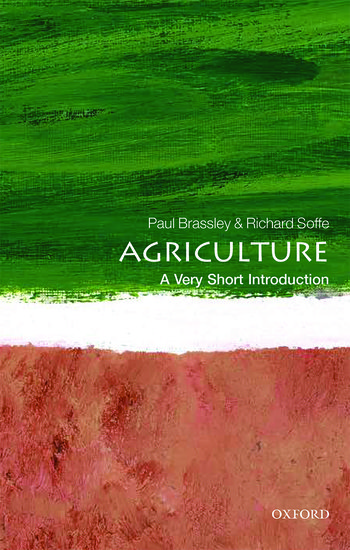A Very Short Introduction | Technology & Engineering
Agriculture
ISBN: 9780198725961
Series: A Very Short Introduction
Agriculture (Technology & Engineering)
A Very Short Introduction Agriculture (Technology & Engineering) Media > Books > Non-Fiction > Education Books Expect Delays of Up to 4 Weeks| Order Below |
ISBN
9780198725961 (10-digit ISBN: 0198725965)
- Description
- Key Features
- Series Description
- Table of Contents
- Introduces readers to the vast range of global agriculture, covering both industrial and developing countries
- Considers both livestock and crop farming, and the multiple issues facing the different forms of farming
- Explains the principles of local and international agricultural markets, and how they determine what farmers produce
- Identifies the universally applicable principles of farming
Agriculture, one of the oldest human occupations, is practised all over the world, using techniques ranging from the profoundly traditional to the most scientifically advanced. Without it we would starve. Yet how many of us understand what is happening in the fields that we see as we drive through the countryside? How often do we think about the origins of the food in our trolley?In this Very Short Introduction Paul Brassley and Richard Soffe explain what farmers do and why they do it. Beginning with the most basic resource, the soil, they show why it is important, and how farmers can increase its productivity, before turning to the plants and animals that grow on it, and tracing the connections between their biology and the various ways in which farmers work with them. The authors conclude by looking at some of the controversial issues facing contemporary agriculture: its sustainability; its impact on wildlife and landscape; issues of animal welfare; and the affect of climate change and the development of genetically modified organisms on farmers.
Oxford's Very Short Introductions series offers concise and original introductions to a wide range of subjects--from Islam to Sociology, Politics to Classics, Literary Theory to History, and Archaeology to the Bible.
Not simply a textbook of definitions, each volume in this series provides trenchant and provocative--yet always balanced and complete--discussions of the central issues in a given discipline or field. Every Very Short Introduction gives a readable evolution of the subject in question, demonstrating how the subject has developed and how it has influenced society. Eventually, the series will encompass every major academic discipline, offering all students an accessible and abundant reference library.
Whatever the area of study that one deems important or appealing, whatever the topic that fascinates the general reader, the Very Short Introductions series has a handy and affordable guide that will likely prove indispensable.
Please note: As this series is not ELT material, these titles are not subject to discount.
Introduction
Soils and crops
Farm animals
Feeding the food industry
Inputs into agriculture
Modern and traditional farming
Farming futures
Further reading
Index
Agriculture, one of the oldest human occupations, is practised all over the world, using techniques ranging from the profoundly traditional to the most scientifically advanced. Without it we would starve. Yet how many of us understand what is happening in the fields that we see as we drive through the countryside? How often do we think about the origins of the food in our trolley?In this Very Short Introduction Paul Brassley and Richard Soffe explain what farmers do and why they do it. Beginning with the most basic resource, the soil, they show why it is important, and how farmers can increase its productivity, before turning to the plants and animals that grow on it, and tracing the connections between their biology and the various ways in which farmers work with them. The authors conclude by looking at some of the controversial issues facing contemporary agriculture: its sustainability; its impact on wildlife and landscape; issues of animal welfare; and the affect of climate change and the development of genetically modified organisms on farmers.
Key Features
- Introduces readers to the vast range of global agriculture, covering both industrial and developing countries
- Considers both livestock and crop farming, and the multiple issues facing the different forms of farming
- Explains the principles of local and international agricultural markets, and how they determine what farmers produce
- Identifies the universally applicable principles of farming
Series Description
Oxford's Very Short Introductions series offers concise and original introductions to a wide range of subjects--from Islam to Sociology, Politics to Classics, Literary Theory to History, and Archaeology to the Bible.
Not simply a textbook of definitions, each volume in this series provides trenchant and provocative--yet always balanced and complete--discussions of the central issues in a given discipline or field. Every Very Short Introduction gives a readable evolution of the subject in question, demonstrating how the subject has developed and how it has influenced society. Eventually, the series will encompass every major academic discipline, offering all students an accessible and abundant reference library.
Whatever the area of study that one deems important or appealing, whatever the topic that fascinates the general reader, the Very Short Introductions series has a handy and affordable guide that will likely prove indispensable.
Please note: As this series is not ELT material, these titles are not subject to discount.
EASY ORDER FORM
PRICES LISTED INCLUDE CONSUMPTION TAX
Price Before Tax:
¥1,790


